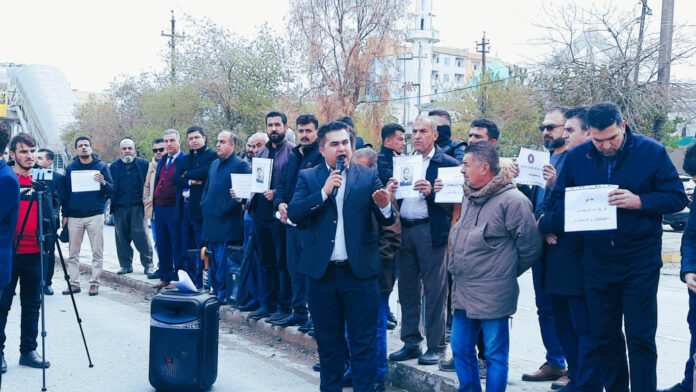Tensions are escalating in the Iraqi Kurdistan Region as widespread anger mounts over unpaid salaries, prompting fears of mass protests and a government crackdown on dissent.
More than one million civil servants and pensioners have gone without their May salaries, exacerbating economic hardship and sparking calls for renewed demonstrations.
On Thursday, civil servants in Sulaimaniyah are expected to take to the streets to protest the Kurdistan Regional Government’s (KRG) failure to disburse payments.
In a bid to quell unrest, security forces have launched a pre-emptive campaign of arrests targeting teachers, activists, and opposition figures.
According to the opposition group National Stance (Halwest), at least 13 members were arrested early Tuesday morning, including five individuals detained outside the group’s office.
“Our comrades simply intended to demand their rights peacefully,” the group said in a statement, accusing the Patriotic Union of Kurdistan’s (PUK) forces of suppressing constitutional freedoms.
Despite the arrests and official denials of protest permits, organisers vow to proceed with Thursday’s demonstration.
“Teachers and other public employees will gather to protest peacefully,” said Dilshad Babani, a teacher in Sulaimaniyah. “People have lost faith in both the Iraqi federal government and the KRG. They see no commitment from either side to resolve the salary crisis.”
Babani said local authorities rejected a permit request, citing security concerns, but suggested the decision was politically motivated. “It’s not about safety—it’s about fear of public mobilisation,” he said.
The regional government has shifted blame to Baghdad. In a press conference following the weekly cabinet meeting, KRG Prime Minister Masrour Barzani criticised the federal government for halting payments.
“We will rely on local revenues and take necessary measures to avoid deepening the people’s suffering,” Barzani said.
The standoff stems from Baghdad’s accusation that the KRG has violated terms of the federal budget law, including failing to transfer oil revenues and refusing to implement salary localisation through federally supervised banks.
As a result, Iraq’s Ministry of Finance suspended budget disbursements and referred the matter to the Supreme Federal Court.
However, the legal path to resolution has been obstructed. The court is currently paralysed following the resignation of its president and nine other judges, leaving a crucial lawsuit filed by Kurdistan public employees in limbo.
Meanwhile, the Kurdistan Region’s oil exports remain frozen, with the pipeline to Turkey shut down since March 2023.
An international ruling requiring Ankara to compensate Iraq for unauthorised Kurdish oil exports has stalled the resumption of shipments, costing Iraq an estimated $19 billion in lost revenue.
Opposition lawmakers say the worsening crisis is a direct result of political deadlock and lack of accountability. Omar Gulpi, a Kurdish MP, condemned the arrest of his brother for merely posting support for peaceful protests online.
“Teachers have been protesting peacefully for a decade. It’s the security forces that provoke violence,” he said.
In Erbil, where the Kurdistan Democratic Party (KDP) holds sway, fear and silence dominate. “There is no space for dissent,” said a doctor speaking anonymously. “People are crushed, and no political leader stands with them.”
With neither political resolution nor economic relief in sight, Thursday’s protests may signal a new phase of public defiance in a region long battered by broken promises and economic neglect.

